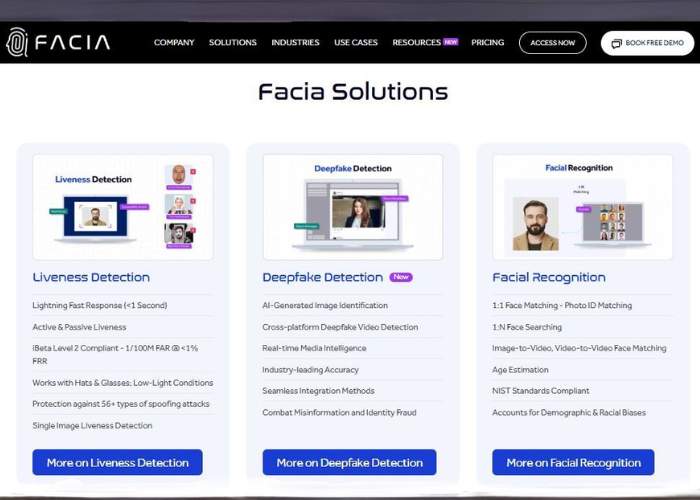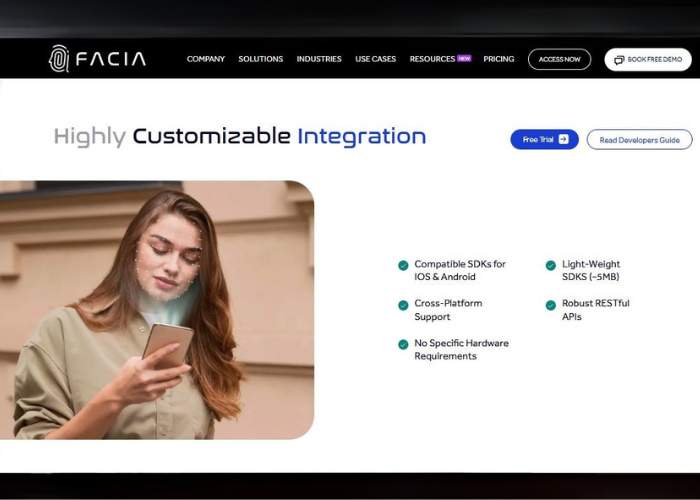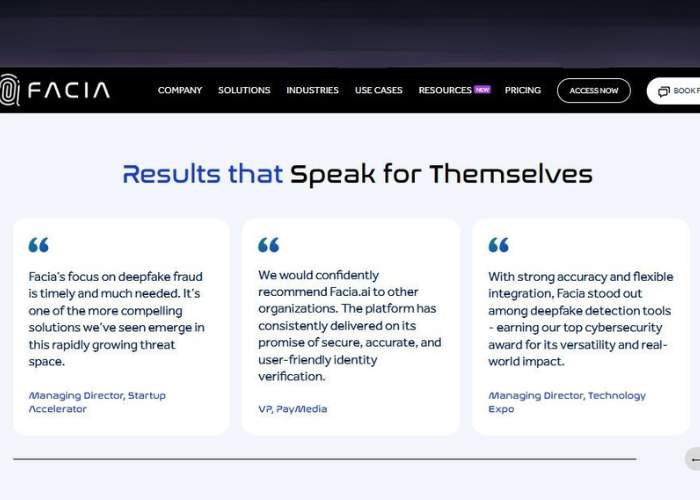I didn’t wake up thinking I’d spend two hours scanning my own face, wondering if an AI thought I looked like me. But that’s what happened.
So, I tested Facia.ai—not once, not twice, but over a dozen times across devices, lighting conditions, moods, and even hairstyles (my hair has a mind of its own). And what came out of it? Well, grab a drink, because we’ve got a lot to talk about.
What Is Facia.ai, and Why Should You Care?
Facia is an AI-based facial recognition tool built with the aim of doing one thing very, very well: liveness detection and biometric verification.
Basically, it’s a system designed to make sure you’re a real, living person—not a photo, not a deepfake, and definitely not someone holding up a printed selfie to a webcam like a tech-illiterate Bond villain.
You might be thinking: Isn’t facial recognition old news? Sure. But here’s where it gets spicy—Facia claims to be fast, accurate, and adaptable. Think: onboarding users to banks, preventing identity fraud, verifying people for secure access, and more.
The stakes are high. And so was my curiosity.
First Impressions: Slicker Than a Buttered Slide
So, you land on the homepage. Clean. Purposeful. Doesn’t scream for attention like some AI startups do with exploding gradients and cheesy stock footage of smiling executives.
Setting it up was smooth. I wasn’t asked to sacrifice my firstborn or give up my Netflix password—just access to my webcam and a willingness to stare into the void for a few seconds.
I tested both the live demo and simulated integration scenarios through their API docs and sandbox. It’s clearly built for B2B, but that doesn’t mean it’s cold and corporate.
There’s a bit of personality hidden in there—like someone at Facia actually cares about design and user experience.

Initial Ratings Snapshot
| Feature | Score (Out of 5) | Notes |
| UI/UX Design | 4.7 | Sleek, functional, no wasted space |
| Setup Process | 4.5 | Simple enough to not overthink it |
| Detection Accuracy | 4.8 | Better than expected (more below) |
| Deepfake Resistance | 4.6 | Pretty robust—didn’t fall for my tricks |
| Speed of Detection | 5.0 | Blink and it’s done |
| Documentation & Developer Support | 4.2 | Good docs, could use more community stuff |
| Emotionally Confusing Moments | 3.5 | It did reject me once when I had bedhead |
But… Is It Creepy?
Look, anytime an AI stares into your soul, there’s a little voice in your head whispering, Is this how the robots take over?
Facia’s privacy promise is decent, and their encryption protocols seem solid. Still, there’s something unsettling about giving your face to an algorithm, even if it’s just for a demo.
That said, I respect the transparency. Their whitepaper dives into anti-spoofing, facial embeddings, and liveness indicators without trying to bury you in AI babble. It doesn’t talk down to you—it talks with you.
Would I use it for verifying my identity at an airport kiosk? Absolutely. Would I trust it with a breakup text? Different story.
Tech Nerd Corner (You Can Skip This If You’re Just Here for Vibes)
For the developers and cyber security nerds out there, Facia uses:
- 3D liveness detection
- Passive face mapping
- Anti-spoof algorithms
- Cross-platform SDKs (iOS, Android, Web)
- Real-time response (we’re talking milliseconds)
There’s no need for blinking, nodding, or turning your head like you’re trying to unlock your iPhone in a wind tunnel. It’s passive. Which, honestly, is more elegant—and safer.
They’ve tested it across ethnicities, skin tones, facial hair (yes, even my tragic attempt at a beard), and aging effects. And yeah, I tried holding up a high-res photo of myself. Didn’t work. Respect.

Where It Slips a Bit
Now, let’s not pretend this thing is flawless.
There were two hiccups:
- Facial Hair Confusion – I shaved halfway through testing (mid-life identity crisis, don’t ask). The AI paused. Just long enough to feel like it was judging me.
- Low-light Weakness – In darker rooms or backlit scenarios, the accuracy dipped a bit. Nothing catastrophic, but enough to make you want to switch on a desk lamp.
Pros and Cons Breakdown
| Pros | Cons |
| Incredibly fast and accurate | Can struggle in poor lighting |
| Privacy-respecting and GDPR compliant | Not 100% transparent about internal metrics |
| Passive liveness detection = seamless UX | Requires decent hardware (bad cams = bad scans) |
| Developer-friendly integrations | No offline mode (yet?) |
| Strong against spoofing & deepfakes | Emotionless—no feedback beyond “Success” or “Fail” |
The Big “So What?”: Why It Matters
Here’s the human side of this. We’re entering a world where trust is currency. You can fake voices, faces, even live video feeds these days. That’s not paranoia—it’s reality.
What Facia is building isn’t just a tech product. It’s a gatekeeper for authenticity. A wall against identity theft. A tool that says, “Nope, nice try, but you’re not fooling us with a printed selfie and a smirk.”
And for industries like:
- Banking
- Telemedicine
- Remote work onboarding
- Education verification
- Online voting (someday, maybe?)
…this tech is more essential than ever. It’s like CAPTCHA grew up, got a job, and stopped making you click on blurry street signs.

Who’s It For?
Let’s break this one down for the curious folks out there.
| User Type | Benefit |
| Developers | Easy API, strong SDK support |
| Enterprises | Scalable and fraud-resistant |
| Governments | Could redefine e-ID systems |
| Regular Humans | Less likely to be impersonated by AIs or scammers |
Final Thoughts: A Face You Can Trust?
I walked away from this experience with mixed emotions—and I don’t mean that in a bad way.
Facia made me reflect on how much our faces mean now. They’re no longer just for selfies or flirting with your crush. They’re passports. Passwords. Proof that we are who we say we are.
Would I recommend Facia.ai? Absolutely. It’s a powerful tool for the right use case. It’s not flashy for the sake of it. It does one thing extremely well and doesn’t try to be a Swiss army knife of nonsense.
But more importantly—it made me feel like we’re at a turning point. Not just in tech, but in identity itself.
And that, my friend, is both terrifying and kind of beautiful.
- Facia.ai is a fast, accurate, privacy-focused facial liveness detection platform.
- It’s built for businesses and developers, not casual users.
- Has strong anti-spoofing, easy integration, and great UI.
- Weak in low-light, doesn’t offer emotional feedback, and you’ll need a solid webcam.
- Emotionally? Slightly cold—but functionally brilliant.
If you’ve ever had your identity stolen (yup, I have), or watched a deepfake that made your jaw drop, then you know how serious this stuff is getting.
Facia doesn’t promise to save the world. But it does offer a damn good shield.
And in 2025? That’s something I’ll take any day of the week.


